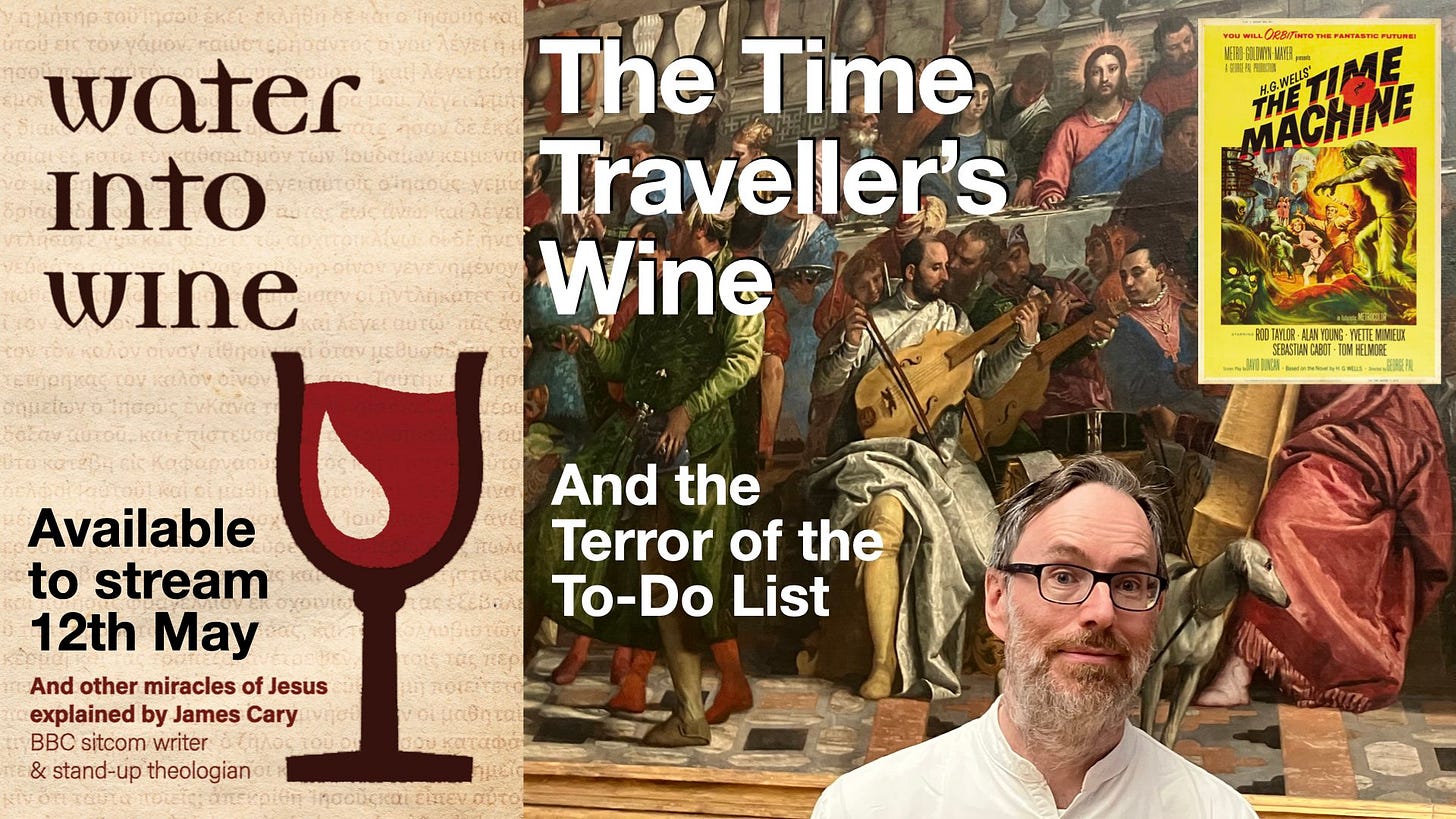The Time Traveller’s Wine
And the Terror of the To-Do List
We all know we could be more productive. Most of us get more emails than we can answer. We double-book ourselves, squeeze things into our schedules and run from pillar to post, feeling guilty that we’ve let someone down.
Or, worse, we’ve let ourselves down, and not ‘fulfilled our potential’. So we make sporadic efforts to carpe the diem, writing to-do lists which only get longer, despite working all hours, after which we are chastised by our phone that we’ve failed to walk enough steps that day.
Being human is a paradox. We are image-bearers of God, who has set eternity in our hearts. Yet we are finite. Even before sin and death entered the world, Adam and Eve could not be in two places at once. They were set to work in a garden. Any gardener knows that there’s always more to be done, even without the thorns and thistles that grow up around the roses, or the productive seed-bearing plants.
Men and women are limited. The sooner we embrace our finitude, the more content we will be. The problem with best-selling books like Atomic Habits by James Clear is they create the illusion that using the right techniques will mean we can get everything done.
But we can’t.
Even if we get up at 5am, like most of these books suggest, we will not get everything done.
If you achieve ‘in-box zero’, there are always more emails to be sent, or some receipts to be processed, or a phone-call that cannot be put off any longer.
For You The War… Never Even Begun
We have to admit defeat in the productivity war. In fact, that’s not enough. We have to admit it was never a war to begin with. The idea of a war against being unproductive is every bit as unwinnable and non-sensical as a war on gravity.
This idea came across strongly in a delightful interview I listened to on a new podcast called The Examined Life podcast. The host, Kenny Primrose, talked to a refreshingly honest productivity writer called Oliver Burkeman, an author with a newsletter called The Imperfectionist. I subscribe, but am normally too busy to get around to reading it (know that feeling?) which consistently illustrates his point.
I mention all this because in recent weeks, I’ve been writing about Jesus turning water into wine, (in advance of my show being available to stream and download from 12th May). One theme that regularly crops up in John’s gospel is abundance.
Life to the Full and Then Some
Jesus produces comically large amounts of wine (John 2). After promising water that will forever quench the Samaritan woman’s thirst (John 4), Jesus produce so much bread that after five thousand men have been fed, there are leftovers (John 6). At the very end of John’s gospel, the disciples, who have caught nothing all night, suddenly catch a net-straining 153 fish. Not just fish. John specifies they were ‘large’ fish (John 21:11). And he would know. He was there.
But another aspect of Jesus’ water into wine miracle is even more astonishing. The water doesn’t just change into grape juice, but wine. And not just wine. Aged wine. The steward says that the groom has saved the best wine ‘til last. What’s the best wine? The aged wine. Here’s how I explain that moment in Water into Wine which isn’t the funniest bit, but one of my favourites:
As finite humans, we are constrained by the ever-forward march of time. We were made that way, and our determination to be infinitely more productive is like Canute attempting to hold back the sea.
But Jesus Christ, who really does command the winds and the waves with his words, is infinite and outside time. He was there ‘in the beginning’. This is why the Bible can be seen as a long beautifully interwoven tapestry in which themes and threads run throughout centuries.
This theme also crops up in another stage show I’ve written, a romantic comedy about science and religion called The God Particle, in which time starts to misbehave. We really see what it means for “a thousand years to be like a day to the Lord” (Psalm 90). So when you get the Water into Wine show on 12th May, why not get The God Particle too? The time will fly!
After May 12th, I’ll write about other things. I promise.
Embracing Our Humanity
The theme for this year’s Keswick Convention is ‘Human’ and the conversation has already begun over at the podcast in which I’ve had a hand. Well worth a listen.
A Perfect Movie
And, talking of beautiful, interwoven tapestries, the latest Popcorn Parenting to drop on the Reformed Mythologist’s YouTube channel is all about Toy Story 2 which is, in my opinion, a perfect movie:



